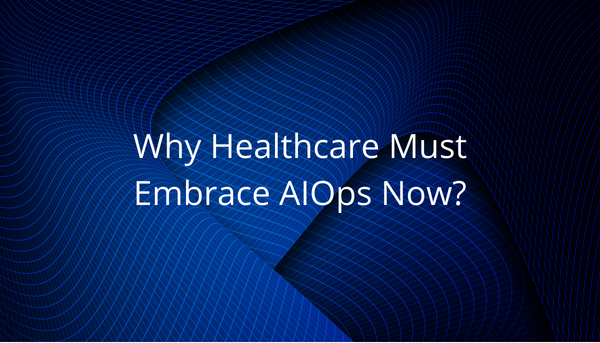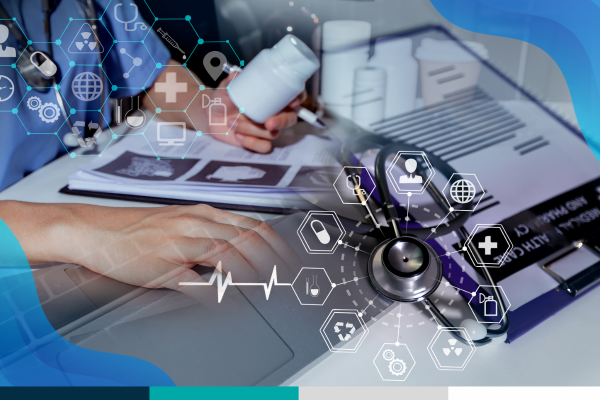Gone are the days when IT was just a support function in healthcare. Today, it’s at the heart of patient care, operational efficiency, and data security. With growing expectations for secure, uninterrupted, and patient-centric care, healthcare organizations can no longer afford to rely on legacy systems.

The healthcare industry generates about 30% of global data, with the compound annual growth rate expected to hit 36% by 2025, according to a McKinsey & Company report.
With the increasing reliance on electronic health records (EHRs), telemedicine, and interconnected medical devices, healthcare organizations face the dual challenge of managing complex IT infrastructures while ensuring the security and integrity of sensitive patient data.
Enter Artificial Intelligence for IT Operations (AIOps), a transformative approach that leverages AI and machine learning to enhance IT operations, bolster cybersecurity, and improve patient outcomes.
What is AIOps in healthcare?

Coined by Gartner in 2016, AIOps refers to the application of artificial intelligence and machine learning techniques to IT operations. By analysing vast amounts of data in real-time, AIOps enables IT teams to proactively identify and resolve issues, automate routine tasks, and gain deeper insights into system performance.
In the context of healthcare, AIOps offers the potential to revolutionize how organizations manage their IT environments, ensuring greater efficiency, reliability, and security.
Why Healthcare Must Embrace AIOps Now

1. Proactive Incident Management and Reduced Downtime
Traditional IT monitoring systems often operate reactively, addressing issues only after they arise. AIOps shifts this paradigm by predicting potential incidents through pattern recognition and anomaly detection.
This proactive approach is crucial in healthcare settings, where system downtimes can directly impact patient care and safety.
2. Enhanced Data Protection and Security
Healthcare organizations handle vast amounts of sensitive data, including personal health information (PHI), making them prime targets for cyberattacks. AIOps enhances data protection by providing intelligent observability across hybrid environments.
By collecting and autonomously analysing data sets in real-time, AIOps can identify vulnerabilities and respond to threats more effectively. This capability is essential for safeguarding patient data and maintaining compliance with regulations like HIPAA.
3. Improved Operational Efficiency
By automating routine tasks such as log analysis, ticket classification, and root cause identification, AIOps reduces the manual workload on IT teams.
This automation allows healthcare organizations to allocate resources more effectively, focusing on strategic initiatives that enhance patient care and operational performance.
4. Real-time Insights for Decision-Making
AIOps platforms aggregate data from various monitoring tools, providing real-time dashboards and predictive analytics.
These insights enable healthcare administrators and IT leaders to make informed decisions, optimize resource allocation, and improve service delivery.
5. Strengthened Cybersecurity Posture
With the rise of sophisticated cyber threats, AIOps plays a critical role in enhancing cybersecurity. By continuously monitoring network activity and employing machine learning algorithms, AIOps can detect anomalies indicative of potential breaches.
This proactive detection allows for immediate response, mitigating risks before they escalate.
6. Cost Optimization
Implementing AIOps can lead to significant cost savings by preventing outages, reducing mean time to resolution (MTTR), and automating routine operations.
These efficiencies are particularly valuable in the healthcare sector, where budgets are often constrained, and operational disruptions can have critical consequences.
Real-World Applications of AIOps in Healthcare

- Predictive Maintenance: Anticipating and addressing equipment failures before they occur, ensuring continuous operation of critical medical devices.
- Alert Noise Reduction: Filtering out non-essential alerts to focus on high-priority incidents, reducing alert fatigue among IT staff.
- Security Enhancement: Identifying and responding to cybersecurity threats in real-time, protecting sensitive patient information.
- Compliance Monitoring: Ensuring adherence to regulatory standards by continuously monitoring system activities and configurations.
The Best Partner for AIOps Implementation in Healthcare
When it comes to implementing AIOps in healthcare, choosing the right partner makes all the difference. At Input Zero Technologies, we specialize in delivering tailored AIOps solutions built to meet the unique challenges of the healthcare industry—seamlessly, securely, and at scale.
As a ServiceNow Elite Implementation Partner, we bring industry-leading expertise in leveraging the power of the ServiceNow platform to drive automation, efficiency, and resilience across your IT operations.
Why Healthcare Providers Choose Input Zero

✅ Expertise in Healthcare IT: In-depth knowledge of healthcare workflows, compliance, and data security.
✅ Customized Solutions: AIOps strategies aligned with your infrastructure and care delivery goals.
✅ Scalable and Future-Ready: Built to evolve with your organization and technology landscape.
✅ Comprehensive Support: From implementation and training to ongoing optimization—we’re with you every step of the way.
✅ ServiceNow Excellence: Harness the full potential of AIOps through our proven ServiceNow capabilities.
The integration of AIOps into healthcare IT isn’t just a tech upgrade, it’s a strategic imperative. With Input Zero Technologies, you gain a trusted partner to help enhance system reliability, strengthen data protection, and ultimately, improve patient outcomes.
Ready to transform your healthcare IT operations with AIOps?
Contact Input Zero Technologies today for your personalized consultation.




